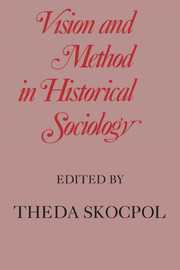Book contents
- Frontmatter
- Contents
- Preface
- 1 Sociology's Historical Imagination
- 2 The Social and Historical Landscape of Marc Bloch
- 3 Beyond the Economistic Fallacy: The Holistic Social Science of Karl Polanyi
- 4 Configurations in History: The Historical Sociology of S. N. Eisenstadt
- 5 Theoretical Generalization and Historical Particularity in the Comparative Sociology of Reinhard Bendix
- 6 Destined Pathways: The Historical Sociology of Perry Anderson
- 7 E. P. Thompson: Understanding the Process of History
- 8 Charles Tilly's Collective Action
- 9 The World System of Immanuel Wallerstein: Sociology and Politics as History
- 10 Discovering Facts and Values: The Historical Sociology of Barrington Moore
- 11 Emerging Agendas and Recurrent Strategies in Historical Sociology
- An Annotated Bibliography on Methods of Comparative and Historical Sociology
- Notes on the Contributors
Preface
Published online by Cambridge University Press: 05 June 2012
- Frontmatter
- Contents
- Preface
- 1 Sociology's Historical Imagination
- 2 The Social and Historical Landscape of Marc Bloch
- 3 Beyond the Economistic Fallacy: The Holistic Social Science of Karl Polanyi
- 4 Configurations in History: The Historical Sociology of S. N. Eisenstadt
- 5 Theoretical Generalization and Historical Particularity in the Comparative Sociology of Reinhard Bendix
- 6 Destined Pathways: The Historical Sociology of Perry Anderson
- 7 E. P. Thompson: Understanding the Process of History
- 8 Charles Tilly's Collective Action
- 9 The World System of Immanuel Wallerstein: Sociology and Politics as History
- 10 Discovering Facts and Values: The Historical Sociology of Barrington Moore
- 11 Emerging Agendas and Recurrent Strategies in Historical Sociology
- An Annotated Bibliography on Methods of Comparative and Historical Sociology
- Notes on the Contributors
Summary
On a gorgeously colorful October weekend in 1979, about a dozen historical sociologists, along with a couple of sociologically acclimated social historians, gathered in Cambridge, Massachusetts. We assembled for three intensive days of discussion about the ideas and methods embodied in the work of major historical sociologists, including several – Reinhard Bendix, Barrington Moore, Jr., Charles Tilly, and Immanuel Wallerstein – who had been the teachers of conference participants. Everyone, including myself as the organizer of this Conference on Methods of Historical Social Analysis, approached the event with considerable skepticism about its likelihood of success.
Papers had been prepared and circulated in advance. Each author had been asked to probe the major works of a single senior scholar, considering the nature of the questions posed; the ways in which theoretical ideas and historical evidence were brought to bear upon one another in answering those questions; the use of comparisons across historical cases; and, more generally, the strategies each scholar had devised to design historical investigations and communicate them to relevant audiences. Although the papers were to focus on sets of works by individuals, they were also supposed to avoid overpersonalizing the issues. Neither biography nor sheer intellectual history was the aim, for I had commissioned these essays to further methodological reflection among a growing network of young historical sociologists.
- Type
- Chapter
- Information
- Vision and Method in Historical Sociology , pp. ix - xivPublisher: Cambridge University PressPrint publication year: 1984

